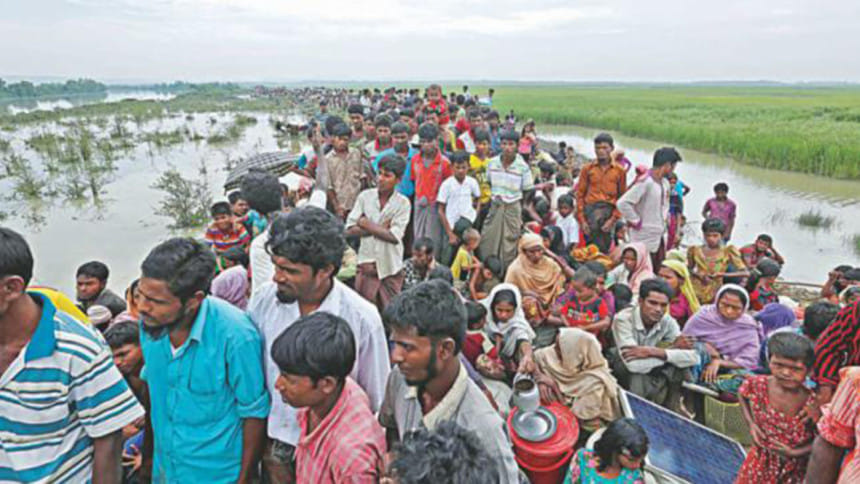Starting Rohingya Repatriation: Lot to do in just one month

Amid uncertainty, continued fleeing of Rohingyas, and fire and destruction in Muslim minority villages in Rakhine, Bangladesh and Myanmar yesterday set up a high-powered Joint Working Group (JWG) to start “safe and voluntary” repatriation of Rohingya refugees within one month.
The Terms of Reference (ToR) of the JWG, signed after a foreign secretary-level meeting in Dhaka yesterday, reiterated starting the repatriation process of hundreds of thousands Myanmar nationals now sheltered in Bangladesh within the January 23 timeframe.
“The JWG shall ensure commencement of repatriation within two months of the signing of the “Arrangement” [signed on Nov 23],” said the ToR, which was originally scheduled to be signed on December 14.
In the November 23 deal, Myanmar had agreed to halt the outflow of its residents to Bangladesh, restore normalcy in Northern Rakhine and to encourage those who had left Myanmar to return voluntarily and safely to their own households or safe and secure places of their choice.
But latest analysis of satellite images of Human Rights Watch reveals new destruction of Rohingya villages even after the bilateral arrangement.
Asked to comment on the latest development, foreign affairs and migration experts in Dhaka said the two countries may miss the deadline as situation in Rakhine remains almost unchanged. And this may seriously hamper the “safe and voluntary” repatriation.
They also pointed to some stringent conditions set in the agreement regarding the verification process, which may create complexities for a smooth repatriation.
In all, Bangladesh now hosts about 1 million Rohingyas.
As many as 6,55,000 of this minority people fled to Bangladesh since violence broke out in Rakhine on August 25, following an attack by Rohingya insurgents on police and army check posts. Earlier in October last year, at least 87,000 Rohingyas similarly fled Myanmar in the wake of violence.
The November 23 deal concerns the repatriation of the Rohingyas who crossed into Bangladesh since last year's violence.
The repatriation of the Rohingya who entered Bangladesh earlier will be considered separately on the conclusion of the present arrangement.
Yesterday's ToR mandates the JWG to undertake all necessary measures to start the safe and voluntary return, resettlement and reintegration process of displaced Myanmar residents as envisaged in the “Arrangement on Return of Displaced Persons from Rakhine State” signed by Bangladesh Foreign Minister AH Mahmood Ali and Myanmar Union Minister U Kyaw Tint Swe in Naypyitaw last month.
The JWG will also develop physical arrangement for return, which would include mechanism of verification, time schedule, transport and logistic arrangements, reception procedures, communication etc to commence the repatriation process, said a Foreign Ministry press release.
“That's a lot of work to do in one month,” a Bangladesh official who attended the meeting told The Daily Star.
The JWG shall involve assistance of the UNHCR and other mandated UN agencies and interested international partners in various stages of repatriation, said the ToR, signed by Bangladesh Foreign Secretary Md Shahidul Haque and Permanent Secretary of Myanmar Ministry of Foreign Affairs U Myint Thu.
Led by the foreign secretaries, the JWG is composed of 15 members from each country.
The members can undertake spot visit to see for themselves the repartition situation and settlement in both countries.
Talking to this newspaper, foreign ministry officials said the JWG would meet in Myanmar's capital at the soonest to make important decisions like formation of various technical committees.
The ToR was finalised at a meeting between officials of the two countries at the State Guesthouse Padma. The nine-member Myanmar delegation was led by its permanent secretary of foreign ministry.
Representatives from relevant ministries and agencies of both countries were also present.
At the meeting, the Myanmar side verbally agreed to allow the media to take up tour to see the repatriation process and the condition of the repatriated people, said a senior foreign ministry official.
“Myanmar agreed to allow the media due to persuasion by the Bangladesh side,” the official added, asking not to be named.
Meanwhile, the UNHCR estimates that the average arrival of Rohingyas has dropped from 745 a day in November to 100 per day so far this month, reports UNB.
“As the refugee emergency in Bangladesh enters its fourth month, people are continuing to arrive from Myanmar. However, the pace of the influx has now slowed,” UNHCR spokesperson Andrej Mahecic told a press briefing in Geneva yesterday.
Two-thirds of the new arrivals in the last one week said they came from Buthidaung in northern Rakhine, according to UNB.

 For all latest news, follow The Daily Star's Google News channel.
For all latest news, follow The Daily Star's Google News channel. 



Comments